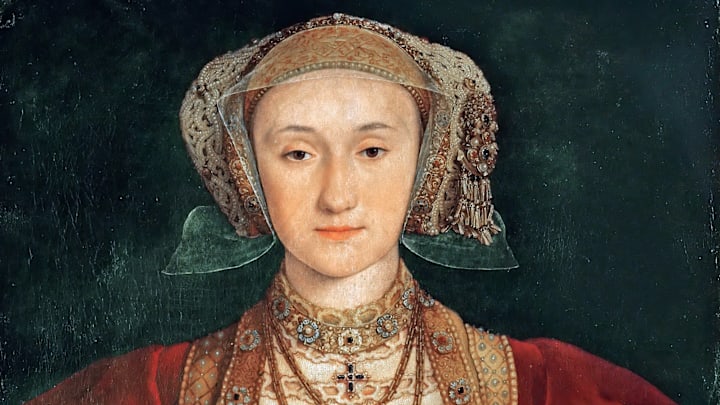It’s all but impossible to learn about Henry VIII’s six wives without picking a favorite. Perhaps you’re partial to the stubborn and imperious Catherine of Aragon, who refused to get divorced without a fight, or the fiery and ambitious Anne Boleyn, who according to some accounts did whatever it took to get ahead. You might admire the quietly alert Jane Seymour, pity the rambunctious teenager Katherine Howard, or be impressed with the savvy and compassionate Katherine Parr.
But too often lost in the shuffle is Henry’s fourth wife, Anne of Cleves. She escaped a joyless family, avoided an unhappy marriage, and jumped at the chance to live her best life.
Henry VIII's Search for Wife Number Four
Henry VIII had been married three times—with just one son and two daughters (who everyone agreed didn’t count for much) to show for it—by the time he set eyes on a portrait of Anne. In his pursuit of a happy marriage and male heirs, Henry had managed to draw the ire of both the pope and the Holy Roman emperor, declare himself head of a brand-new Church of England, get excommunicated, and behead a woman he’d once loved to the point of obsession.
Despite his track record as a husband, Henry’s status made him an intriguing option for any parent with an eye for political matchmaking. And though he understood the importance of a strategic alliance—Catholic Europe was powerful and menacing—Henry was said to be a romantic. He sent his ministers far and wide in search of a bride who would suit the needs of both his heart and his nation.
After scouring the continent, one name rose to the top of the list: Anne of Cleves, a 24-year-old from Germany whose Protestant family seemed like good allies to have in England’s corner.
"I Like Her Much Worse"

The Duke of Cleves ran a tight ship. His daughter Anne had been brought up in a setting where fun and music were discouraged and feminine modesty was the name of the game. Few had seen much of the young princess, who was typically swathed in heavy veils. Reports of her beauty—compared to “the golden sun” by Thomas Cromwell, Henry’s fixer and the brains behind the match—were hopeful at best.
Other minor factors also complicated the potential arrangement. For one, Anne couldn't speak French or Latin, the lingua francas of European courts at the time, let alone English. Despite the roadblocks, Cromwell dispatched court painter Hans Holbein to capture Anne’s likeness. The resulting miniature pleased Henry enough to result in a formal offer.
Anne’s looks and manners impressed all she met along her procession into England. But her first encounter with Henry was a certified disaster. The king was polite and courteous, then fumed the moment he’d bid her goodnight. “I see nothing in this woman as men report of her!” he shouted.
It’s impossible to know what Anne’s impression was of her future husband. But between his oozing leg injury and the fact that he was twice her age, it’s hard to imagine she was head over heels.
Henry and Anne were married on January 6, 1540, just five days after they first met. The king was unimpressed by their wedding night: "Now I like her much worse," he said.
Our best evidence about Anne’s feelings comes not from what she did but from what she did not. Unlike two of her predecessors, Anne put up no fight when Henry moved to undo their wedding vows. Just six months in, their unconsummated marriage was annulled.
A Prize in Disguise
Anne’s lack of ambition turned out to be the key to her success.
Instead of being Henry’s queen, Anne quickly assumed the role of his sibling (the two referred to one another as “brother” and “sister” in correspondence), and as such ranked above nearly every other woman in the English court. Rather than going back to her stuffy family, she remained in England, where she enjoyed a generous allowance, her own property, and the freedom to live life as she pleased.
While courtiers (and wives) rose and fell in their orbits around the king, Anne remained on good terms with Henry and his children. Despite dying at just 41, she outlived him and all of his other wives, enjoying a comfortable life on her own terms until the end.
